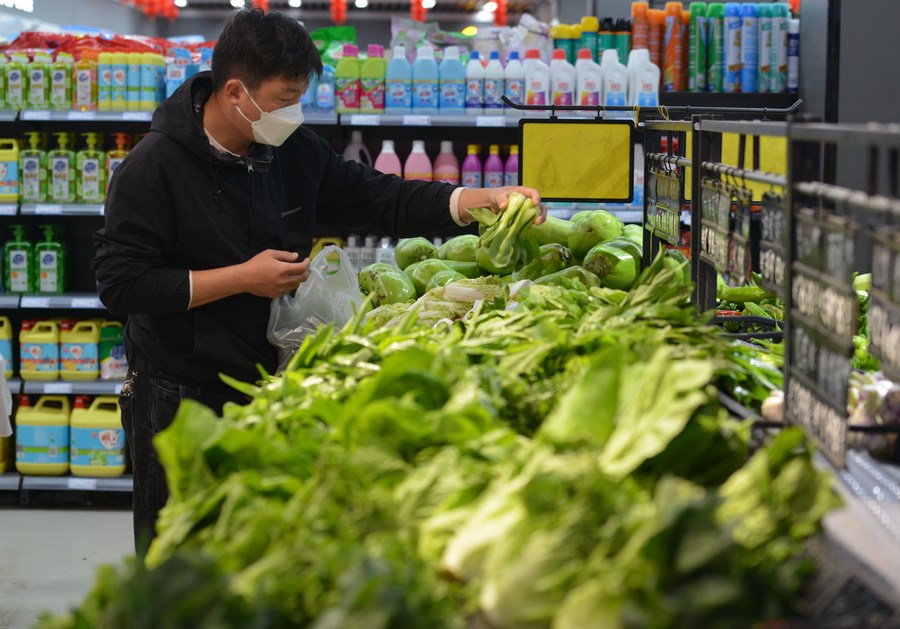Wide gap in commodity prices between China and the U.S. forms stark contrast as inflation soars in Western countries
China’s consumer price index (CPI) rose 2.1 percent year-on-year in May, growing at a rate unchanged from April. The producer price index (PPI), meanwhile, which measures the costs for goods at the factory gate, saw its growth slow to 6.4 percent in May, moderating for seven consecutive months, Meng Wei, spokesperson for the National Development and Reform Commission, told a press conference held on June 16.

A customer buys vegetables at a supermarket in Linquan County, east China's Anhui Province, May 11, 2022. (Xinhua/Lu Qijian)
Meng said China will see its CPI continue to run within a reasonable range and is capable of attaining the 3-percent annual target amid a surge in worldwide inflation.
On the PPI front, despite geopolitical disruptions in the international energy and grain markets, Meng expected the PPI rise to further narrow, citing China’s self-sufficient grain supply, ample coal resources and measures aimed at stabilizing prices.
The smooth track record for China’s commodity prices are in marked contrast to that of many advanced economies, including the U.S. and European countries, which have seen persistent price hikes.
In May, the consumer price indexes for the U.S., the U.K. and the eurozone increased by 8.6 percent, 9 percent, and 8.1 percent year-on-year, respectively, hitting new highs.
The consumer prices of the U.S. soared unexpectedly in May, hitting another new 40-year high since March.
Statistics have indicated that the high inflation has been felt in various fields of economic activity in the U.S. and in various aspects of people’s everyday lives in the country.
Energy prices climbed 34.6 percent year-on-year while food prices rose by 10.1 percent from a year ago. New vehicle prices were up 12.6 percent over the previous year, while airline fares surged 37.8 percent year-on-year. Excluding food and energy prices, the core inflation rate for the U.S. was up 6 percent for two consecutive months.
Experts believe that a slew of muddleheaded policies that the U.S. government has implemented over the past few years, including trade protectionism and ultra-loose monetary policies, have led to the current spell of inflation persistence in the U.S.
After the Ukraine crisis broke out, the U.S. and its allies repeatedly imposed sanctions against Russia, which negatively affected the global food and energy markets, and led to rapid rises in the prices for bulk commodities.
To deal with the inflationary pressure, on June 15, the U.S. Federal Reserve raised its benchmark interest rates three-quarters of a percentage point in its most aggressive hike since 1994.
According to an analysis by American columnist Frida Ghitis on CNN, governments pumped cash to keep people afloat, fueling inflation that is now forcing central bankers to raise interest rates and take other painful measures.
Actually, the high level of inflation in the U.S. is no longer a problem just by itself alone. Washington has instead made the international economic and financial environment more volatile, having brought about more uncertainty to the future.
Experts have concluded that inflation will likely continue expanding in various fields of the U.S. economy for some time and will unlikely dip back down over the short-term, very likely resulting in an eventual economic recession.
They suggested that instead of increasing interest rates and tightening monetary policies, what’s more important for the U.S. now is to immediately correct its misguided policies and strengthen international cooperation beyond the Western bloc.
In comparison, the level of commodity prices in China is much lower than that of major economies such as the U.S. and Europe, with China continuing to play an important role as a "stabilizer" in global commodity prices.
Photos
Related Stories
- U.S. small business confidence drops in May as inflation fears mount: Reuters
- U.S. millionaires raise cash on fears Fed can't tame inflation, stave off recession: CNBC
- Seven in 10 economists expect recession in U.S. next year: poll
- U.S. Fed rolls out largest rate hike since 1994, weighing on global economy
- U.S. Fed raises rates by three-quarter point amid inflation surprises
- Experts say U.S. might already be in recession: CNBC
- Surging U.S. inflation may trigger bigger rate hike, push up recession risk
- Low-income Americans most impacted by high gas prices: Axios
- Country's policies seen helping cool high inflation around world
- How far can U.S. gas prices go above current historical highs
Copyright © 2022 People's Daily Online. All Rights Reserved.









